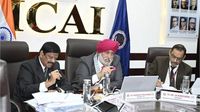The Institute of Chartered Accountants of India (ICAI) has announced a historic change to its examination schedule for the Chartered Accountant (CA) Final exams, which will now be held three times a year starting in 2025. This significant shift, revealed during the 26th Council meeting of the ICAI on March 27, 2025, aims to enhance flexibility and accessibility for students pursuing a career in Chartered Accountancy.
Previously, the CA Final exams were conducted biannually, but the new schedule will allow examinations in January, May, and September. This adjustment aligns the CA Final exams with the existing structure for the CA Intermediate and Foundation courses, which were also transitioned to a three-times-a-year format in 2024. The ICAI stated that this change is designed to provide students with greater opportunities and flexibility in their exam schedules, thereby improving their chances of success.
In a statement, the ICAI emphasized that the decision to hold the CA Final exams three times a year reflects a commitment to align with global best practices. “This examination was being held twice a year, and in order to provide students with greater opportunities and flexibility, the 26th Council of the ICAI has taken a historic decision to hold the CA Final exam three times a year,” the organization noted.
Moreover, the ICAI also announced modifications to the Post Qualification Course in Information Systems Audit (ISA). Previously conducted twice a year in June and December, the ISA Assessment Test will now be held three times annually—in February, June, and October. This change is aimed at increasing access and convenience for ICAI members pursuing this certification.
With the introduction of three exam cycles for the CA Final, all three levels of the CA course—Foundation, Intermediate, and Final—will now have equal opportunities for examination each year. This uniformity is expected to alleviate some of the pressure students face while waiting for the next exam cycle. The ICAI believes that by providing three chances to appear for each exam, aspirants can better manage their schedules and reduce stress.
The decision comes in the wake of a successful year for CA aspirants, with 31,946 students passing the CA final exam in 2024. Of those, 20,446 students qualified in May, while another 11,500 successfully completed their exams in November. These numbers illustrate the growing interest in the CA profession and the need for a more accommodating examination schedule.
In addition to enhancing student opportunities, the ICAI's decision is also seen as a response to the evolving landscape of professional education, where flexibility and accessibility are increasingly valued. The ICAI aims to ensure that its examination processes remain competitive and relevant in a global context.
For context, the Institute of Chartered Accountants in England and Wales (ICAEW) has a similar structure for its ACA exams, which are held across three levels: certificate, professional, and advanced. The professional exam is conducted four times a year, while the advanced exam occurs twice a year, with certificate exams available year-round. This model has been successful in providing candidates with multiple opportunities to complete their qualifications, and the ICAI's new schedule aims to replicate that success.
As the ICAI moves forward with these changes, it remains committed to enhancing the quality of education and support for Chartered Accountancy students. The organization’s efforts reflect a broader trend in professional education, where institutions are increasingly recognizing the importance of accommodating diverse student needs.
In conclusion, the ICAI's decision to hold the CA Final exams three times a year starting in 2025 is a significant milestone for Chartered Accountancy education in India. By aligning its examination schedule with global best practices and providing greater flexibility for students, the ICAI is taking a proactive step towards improving access to the CA profession and supporting the aspirations of future chartered accountants.






